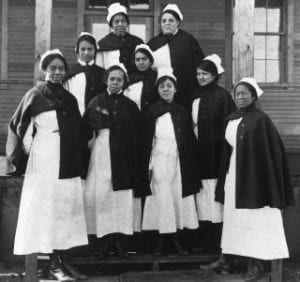When major events happen in our world, I tend to look at them and remember them through my own lens of nursing. My first thought is always from a nursing perspective – what will be in the impact on the hospital, what will nurses need, what kind of care will the patients require? I can describe to you the patient I was caring for when the Columbine massacre occurred, what was happening in my PICU on 9/11, and what nursing conference I was attending when a student opened fire in a Parkland, Florida school.
It’s been the same over the past few months. My first thought when the current pandemic hit was that I wanted to return to the hospital to take care of patients (spoiler alert: they didn’t want me). Now, over the past week, I can’t help but think about the Black nurses who are caring for patients in areas ravaged by violence and dealing with their own traumatic experiences with racism and marginalization.
There have been many comparisons, especially in the healthcare community, of our current pandemic to the 1918–1919 influenza pandemic. My own nurse friends are out there on social media warning of repeating the same mistakes that led to deaths from a “second wave.”
Did you know that the Great Flu Pandemic was a turning point for Black nurses in history? The history of Black nurses is even more troubling than the history of nurses in general. Black women weren’t “allowed” to be nurses until around the end of the 1800s and the early 1900s – after the Civil War. Black women definitely provided nursing care – think Harriet Tubman and Sojourner Truth – they were just not allowed to enter the profession formally until around 1900 and then only through the establishment of Black hospitals that provided hospital-based nursing programs. Black nurses experienced prejudice on three fronts: they were nurses (not doctors), women (not men), and Black (not White).
Then the influenza pandemic hit. People needed to be cared for and public health departments did not have the resources. Because it was what they were used to doing, Black nurses did what needed to be done and cared for everyone, Black or White. It was the first documentation of Black nurses caring for White patients on a large scale. This was not a usual practice. In fact, Black nurses were working for the same Red Cross agency as White nurses, but had letter designations in front of the numbers on their badges, so they wouldn’t inadvertently be assigned to White patients, and were working for half of the salary of White nurses. However, the pandemic brought on unusual practice. Sound familiar?
The influenza pandemic was a turning point for Black nurses because official entities, like the military, could not longer use the excuse that Black nurses would not be as useful as White nurses because they could not care for everyone. Black nurses had been caring for both Black and White people during the influenza pandemic. Though they had been approved for entry into the military nurse corps before this, White military leaders found excuse after excuse not to put them into service. Black nurses who moved forward on their own to care for all patients during the influenza pandemic led to Black nurses admittance to the military and paved the way for Black nurses to become both military and civilian nursing leaders.
This is a photo of the first group of Black nurses serving at Camp Sherman in the Army Nurse Corps after the Great Flu Pandemic of 1918-1919. (Courtesy of womenshistory.org)
Do you want to learn more? The National Black Nurses Association is a great resource and about this particular topic, look for an article called The Eighteen of 1918-1819: Black Nurses and the Great Flu Pandemic in the United States, by Marian Moser Jones and Matilda Saines, published in the June 2019 issue of the American Journal of Public Health.


Thank you so much for this. <3
Thank you for highlighting this.